|
Getting your Trinity Audio player ready... |
Tabla de Contenido/ Table of Contents
- 1 Relationship Between Evictions & Financial Schemes & the Role of Authorities in Miami-Dade. 2025: A Critical Analysis
- 1.1 Controversy in a Sweetwater Trailer Park: A Convergence of Interests
- 1.2 Context of Evictions and Police Abuse
- 1.3 Documented Abuse
- 1.4 The Source of Financing: A Detail We Cannot Overlook
- 1.5 Coincidence?
- 1.6 Financial Schemes and Their Connections
- 1.7 Is It Just Business, or Are There Political Implications?
- 1.8 Police Abuse: A Reflection of Disconnection with the Community
- 1.9 Demolitions Have Already Begun
- 1.10 Miami-Dade at a Crossroads: Private Interests or Community Welfare?
Relationship Between Evictions & Financial Schemes & the Role of Authorities in Miami-Dade. 2025: A Critical Analysis
Controversy in a Sweetwater Trailer Park: A Convergence of Interests
The unfolding controversy at a trailer park in Sweetwater highlights a convergence of questionable interests involving police abuse, mass evictions, and a contentious financial connection to companies with historical ties to Cuba. At the center of this debate are Miami-Dade Mayor Daniella Levine Cava, Commissioner Pepe Díaz, and the financial link between Stonegate Bank, now absorbed by Centennial Bank, and development projects in Miami-Dade.
Context of Evictions and Police Abuse
In a recent incident captured on security cameras, an elderly trailer park resident was dragged and thrown to the ground by a police officer. This unnecessary display of force underscores how displaced residents are being treated amid urban development projects.
Documented Abuse
The footage reveals an elderly woman who posed no threat. Outraged by the eviction process, she attempted to voice her concerns but was violently subdued. This case exemplifies how authorities handle the escalating tensions in communities affected by political and business decisions.
Alex Otaola live, latest news from Cuba – Hello! Ota-Ola (Friday, December 6, 2024)
Let’s take a moment to focus on the trailer park in SWEETWATER, where, as I’ve been telling you, there’s a strange, very strange smell of double intentions.
I’ll say this again because I stand by it: it’s logical that when a private property is sold, the tenants renting there have to leave.
It’s logical that the landowners want to do whatever they wish with their property.
But it’s also logical that the city, the county—those issuing permits, granting authorizations, and changing zoning for the new projects planned in the same trailer park with 900 homes (not 900 people, because each trailer houses more than one person, and some of those trailers are directly set up as efficiencies)—should ensure that their approvals do not leave these people homeless.
This is a massive eviction.
And the authorities issuing the permits and approving the zoning changes must find ways to help these people, relocate them, and assist them.
It can’t be that the only “help” that surfaces is to physically carry an elderly woman and slam her headfirst to the ground, as happened with this resident of the trailer park. Now the security footage has surfaced, and I want us to watch it calmly.
Put it up, Sandy, please.
🎥 [Video of the incident plays]

Look, I’m not going to sugarcoat this. I have the right to say it:
—“You’re not wanted here.”
—“Why don’t they want me? Tell me. Why don’t they want me? Say it with all the noise you’re making!”
—“Well, I’m done with the noise. I’ve already said what I needed to say. I’m going to pay my rent. Can you come back later?”
—“Let’s go.”
—“I’m not going anywhere right now.”
—“Ma’am, let’s go.”
—“I’m not going anywhere right now. I’ll quiet down! Go ahead, arrest me if that’s what you want. Why are you going to arrest me? Why?”
And then the scuffle begins. The woman shouts:
“Film it! This is not right! This is not fair!”
Otaola: Folks, do you see an aggressive person here? Do you see any threat to the officer’s safety or anyone else in that place?
What I see here is an elderly woman, outraged by the situation they’re living through in the office where she has to pay her rent.
The officer could have handcuffed her. He could have taken her into custody for not complying, for not standing when told.
Where does the abuse of power come in?
The abuse lies in the officer dragging her and slamming her to the floor unnecessarily.
What was the need for this?
What’s the need to mistreat our elders, who are already being displaced from the city of Miami? They’re being tricked with inflated taxes, with the rising property taxes that make it impossible for them to continue paying—even on properties they’ve fully paid off.
Do you remember the case of the building on Biscayne Boulevard? There were people who had fully paid for their apartments, but they had no say because the association held the majority vote. And who were the majority? The same investors who gradually infiltrated, buying up properties until, once they held the majority, they ordered the demolition of the building.
It’s the same thing happening here.
Find out about this case here 👉Miami Condo Owners Report Forced Eviction
Note: Reference to the Article: Condo Owners in Miami Accuse Forced Eviction
By Ivan Taylor
Updated: September 7, 2023, 10:11 PM EDT / CBS Miami
Last Friday, residents of the Biscayne 21 condominium in Miami faced a new stage of conflict as they received a notice stating that the building’s services would be suspended and that they must vacate their homes by 5 p.m. on the same day. The development, led by Two Roads Development, demanded the complete evacuation of the building, prompting resistance from some owners who refuse to leave without a fight.
This controversy, originally reported on September 7, 2023, highlights the growing pressure faced by homeowners in properties targeted by developers, particularly under Florida laws that allow the dissolution of condominium associations with just 80% approval.
The Biscayne 21 case has garnered significant attention and controversy. Below is a summary of the key events:
Acquisition by Two Roads Development:
In 2022, Two Roads Development acquired the majority of the units in Biscayne 21, a 13-story building with 192 units, for approximately $150 million. Two Roads aimed to demolish the building and construct a new luxury skyscraper.
Manipulation and Pressure:
Owners of the remaining units alleged they were manipulated, intimidated, and pressured to sell their units. According to these owners, the condo association illegally modified its governing documents to lower the termination approval requirement from 100% to 80% of owners.
Demolition and Eviction:
Despite resistance from some owners, Two Roads Development achieved the necessary majority to proceed with the building’s demolition. Owners who refused to sell their units were evicted and offered buyout prices they deemed unfair.
Legal Proceedings:
Affected owners filed a lawsuit in the Miami-Dade Circuit Court, alleging that Two Roads Development’s actions were illegal. A state appeals court ruled in favor of the owners, declaring that the modification of the condo association’s documents was unlawful and that owners were entitled to a valid vote on the termination of the association.
Owners of Biscayne 21 claimed that investors from Two Roads Development systematically purchased units in the building until they reached a majority in the homeowners’ association. Once they achieved majority control, they amended the association’s documents to lower the termination approval requirement from 100% to 80%. This allowed them to proceed with the building’s demolition, despite resistance from some owners who did not want to sell their units.
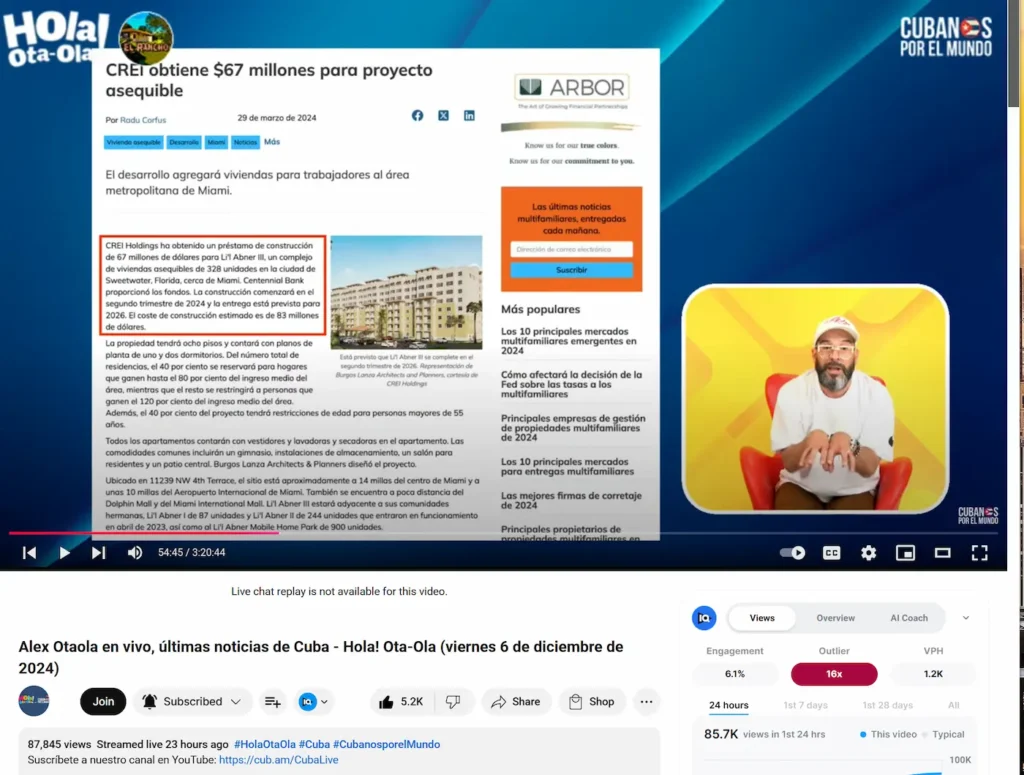
The Source of Financing: A Detail We Cannot Overlook
Listen closely—the sources of financing for the project being developed on this trailer park are linked to companies that have had a presence in Cuba.
The company Stonegate, which absorbed and took over entities authorized during the Obama era to issue credit cards in Cuba, is behind this financing.
Coincidence?
This is happening in the heart of Cuban exile. We’re not talking about a neighborhood in Iowa; we’re talking about Miami, the city with the most influential Cuban community in the world.
Within months, if not sooner, we will see international criticism emerge regarding what’s happening with this trailer park. This mass eviction, tied to companies that have or have had connections to Cuba, is a low blow to the Cuban exile community.
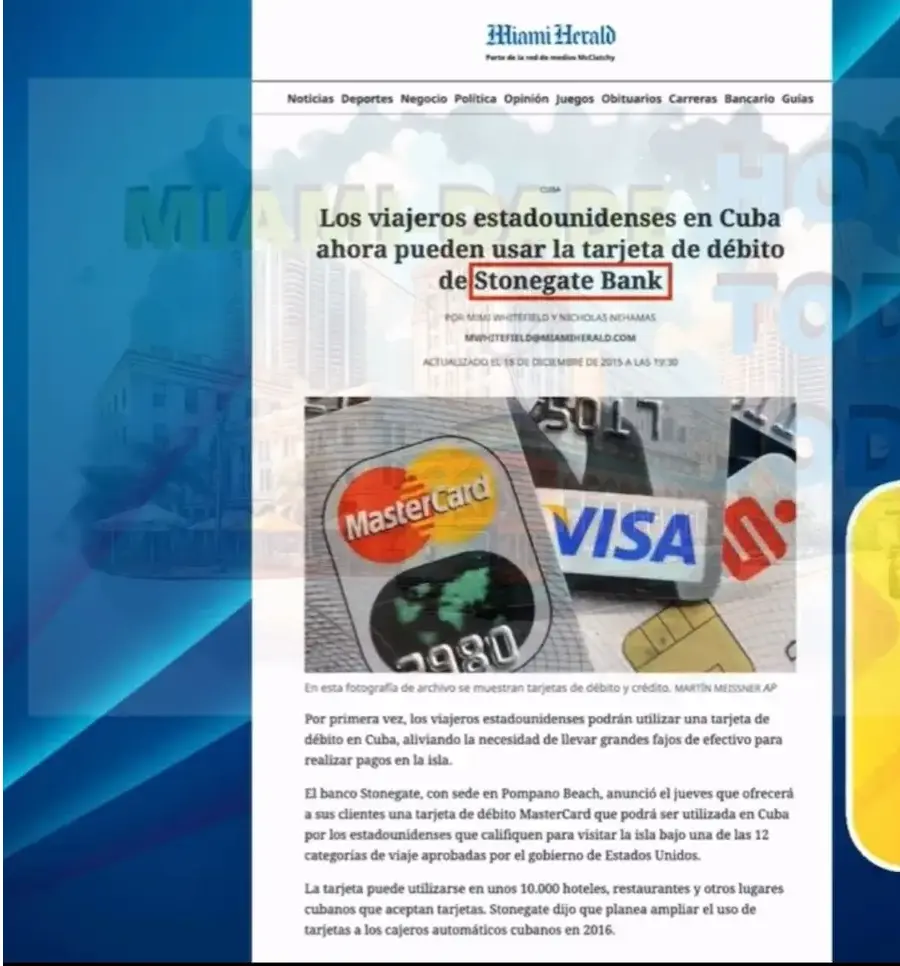
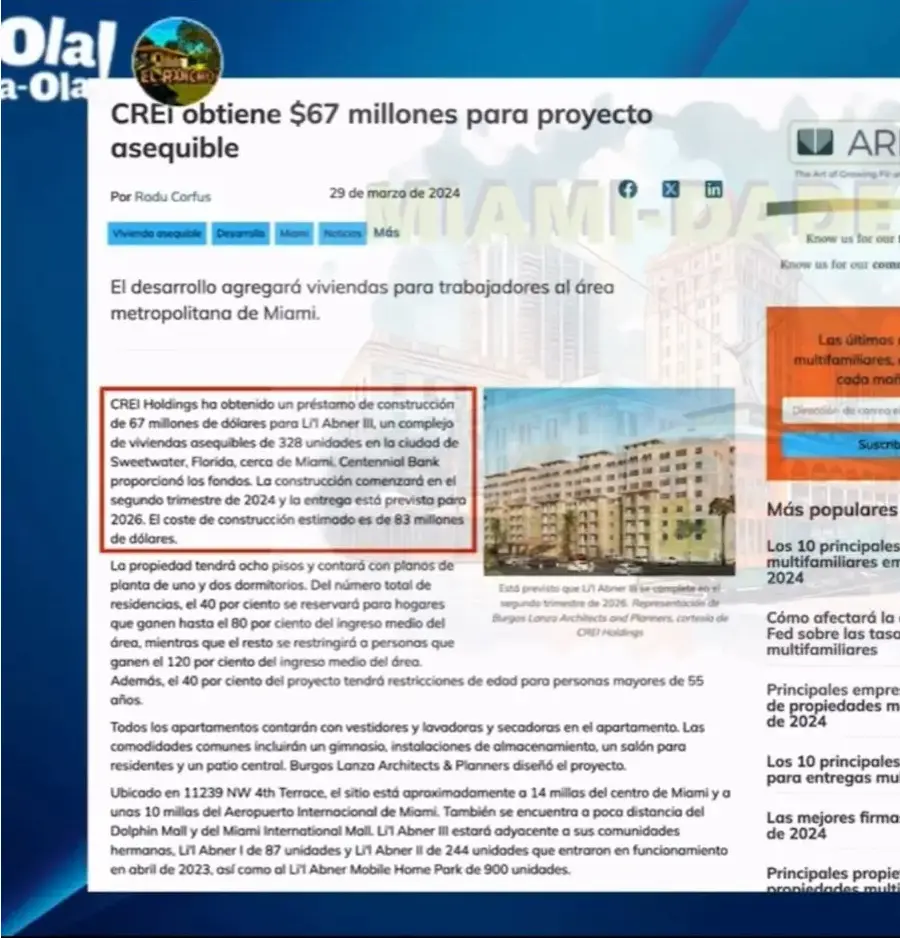
Financial Schemes and Their Connections
Centennial Bank and Stonegate Bank: Origins of Funding
- CREI Holdings’ Financial Backing: Centennial Bank, which acquired Stonegate Bank in 2017 for $820 million, has provided substantial loans to CREI Holdings. This includes $67 million for the construction of Li’l Abner III, a project focused on affordable housing in Sweetwater.
- Stonegate’s Role in Cuba: Before its acquisition, Stonegate Bank was one of the few U.S. institutions authorized during the Obama administration to facilitate financial transactions with Cuba, including credit card issuance.
Local Impact
- Housing Developments: Centennial Bank now supports projects like Li’l Abner III, financing multimillion-dollar developments while vulnerable communities face evictions without adequate safeguards.
- Political Implications: The connection between a bank with historical ties to Cuba and a project in Miami—the exile capital—raises serious questions.
Is It Just Business, or Are There Political Implications?
The connection between an entity with historical ties to Cuba and a project in the capital of Cuban exile raises serious questions:
- Are these developments being used to launder economic interests potentially linked to the Cuban regime?
- Why is a company with historical links to Cuba allowed to finance projects in Miami?
Police Abuse: A Reflection of Disconnection with the Community
We saw how a police officer, who is supposed to protect citizens, dragged an elderly woman and threw her to the ground, even though she posed no threat.
This is the level of disconnection we’re witnessing between the authorities and the residents. That woman wasn’t a criminal, nor was she attacking anyone. She was simply expressing her outrage at being evicted from the place she has called home for so many years.
Demolitions Have Already Begun
Those who have already left the park have watched as bulldozers raze everything, leaving the trailers in rubble.
For those still living there, the message is clear: Don’t wait until the last minute. Find a lawyer, unite as a community, and demand your rights.
The deadline is May 19. Until then, we are likely to see more incidents like this unless our authorities take action to help these people.
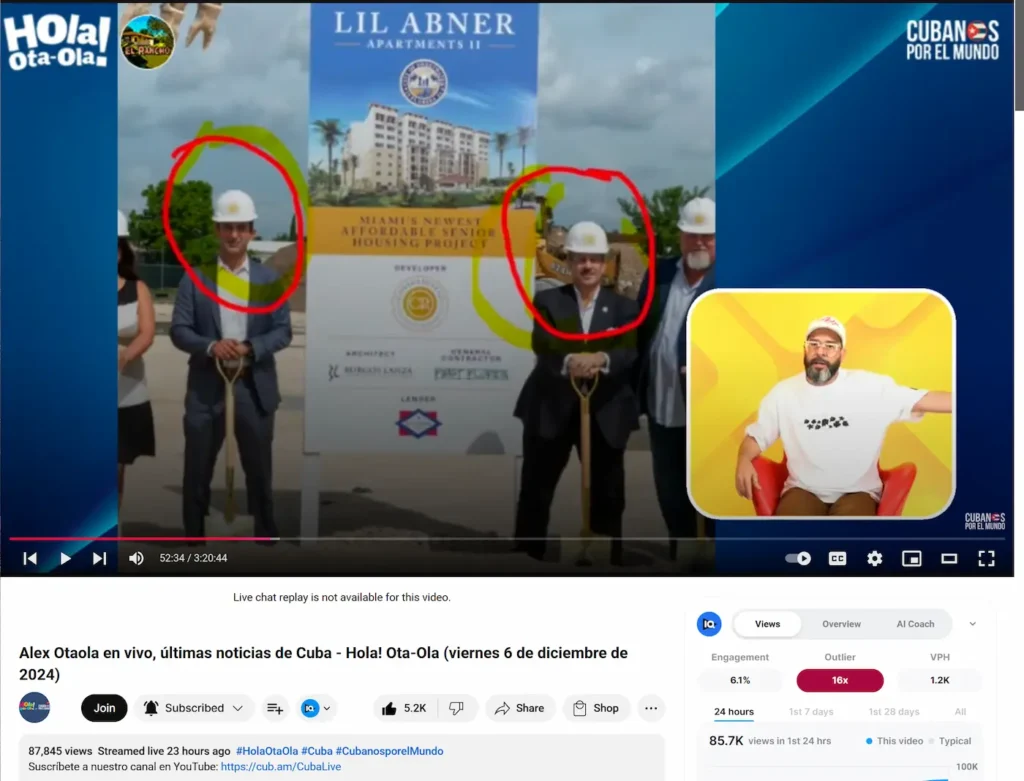
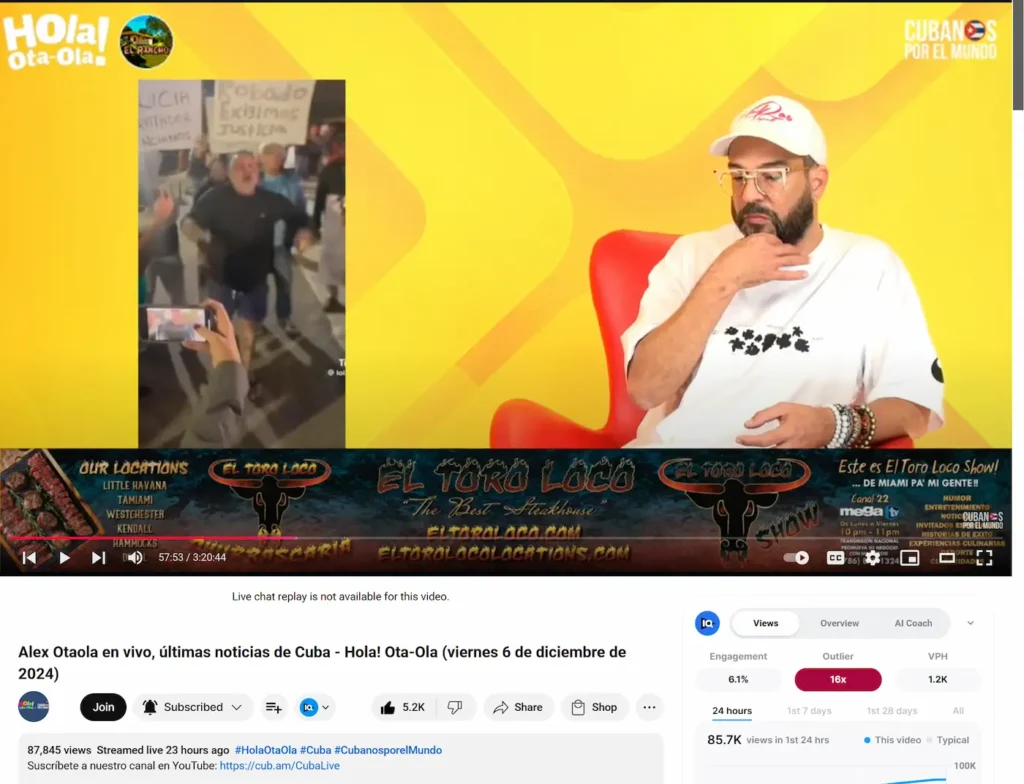
The Role of Daniella Levine Cava and Pepe Díaz
Responsibility in Local Decisions
Mayor Daniella Levine Cava and Commissioner Pepe Díaz have been criticized for their inaction in defending displaced residents and for their permissiveness toward projects favoring large developers.
- Pepe Díaz: His connections with developers and apparent disregard for the welfare of affected residents place him at the center of the controversy.
- Levine Cava: She has the capacity to implement policies to mitigate the impact of these evictions but has so far shown no interest in doing so.
What Is Mayor Daniella Levine Cava Doing?
The solution is in her hands. She can intervene, but she appears disinterested in doing so.
This is why the call is clear: Neighbors, unite, seek legal representation, and demand what is fair.
This is not just a zoning or urban development issue. It’s a human problem—a matter of dignity and respect for those who have built this community.
Impact on the Community
The Human Cost of Urban Development
The trailer park in Sweetwater housed hundreds of families. The mass evictions and lack of real alternatives reflect a disconnect between urban development priorities and human needs.
Demolitions in Progress
While bulldozers have already begun leveling the vacated trailers, the remaining residents face paralyzing uncertainty.
What Is the AMI, and How Does It Impact This Debate?
The Area Median Income (AMI) is a standard used to define what qualifies as “affordable housing.” In Miami, the average AMI is approximately $68,300.
- 80% of AMI: Low-income households earning around $54,640.
- 120% of AMI: Moderate-income households earning around $81,960.
Although developers label their projects as affordable, rents in the 120% AMI range can exceed $2,500 per month, an unaffordable price for many working families.
Conclusion: Key Questions and the Path Forward
Are We Facing a Conflict of Interest?
The link between companies with financial connections to Cuba and local projects in Miami-Dade raises concerns among Cuban exiles, who see this as an affront to their history of fighting against the Castro regime.
What Should Authorities Do?
- Ensure Transparency: Daniella Levine Cava and Pepe Díaz must clarify their roles in approving these projects.
- Protect Residents: Mass evictions must be handled sensitively, providing real alternatives and support to affected families.
A Call to Action
The Miami-Dade community must demand greater oversight and accountability in the management of these developments. Meanwhile, the financial connection with entities historically linked to Cuba must be thoroughly investigated.
Miami-Dade at a Crossroads: Private Interests or Community Welfare?
Miami-Dade faces a pivotal moment: Will we allow private interests to dictate the future of our city, or will we prioritize the welfare of our communities? The question becomes even more relevant when, as Alexander Otaola pointed out, the vision of a “Latin Dubai” seems to be built on the sacrifice of the elderly who laid the foundation of this county. Is this the legacy we want to leave behind?
Want more post like this?
Head over to our homepage for the latest updates from South Florida and beyond:











